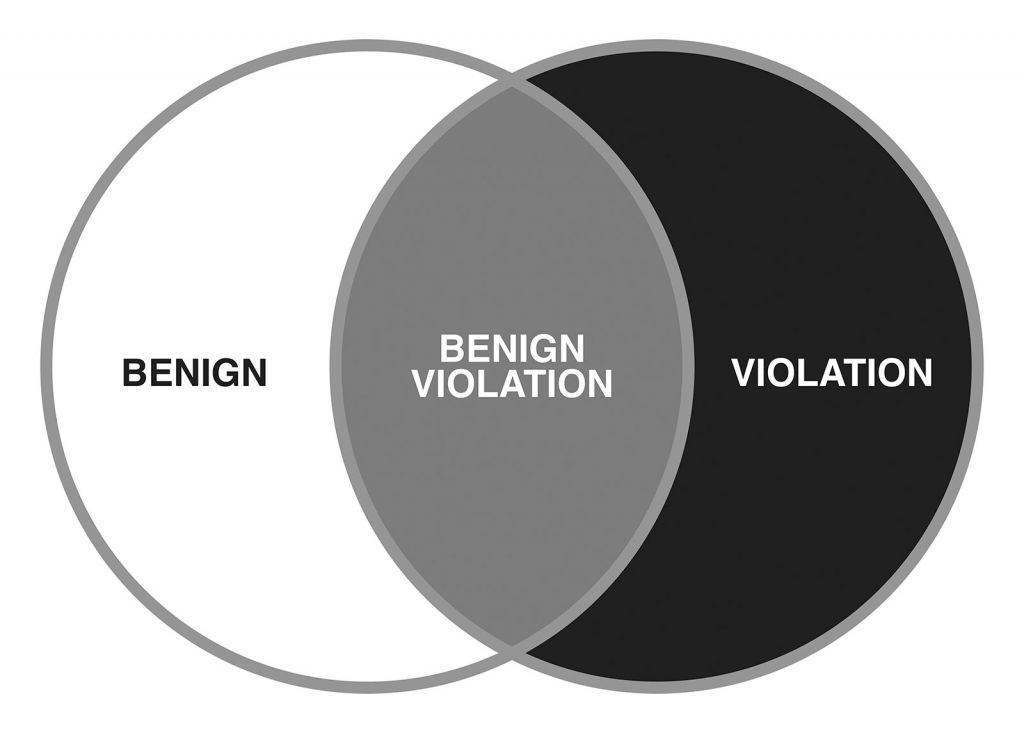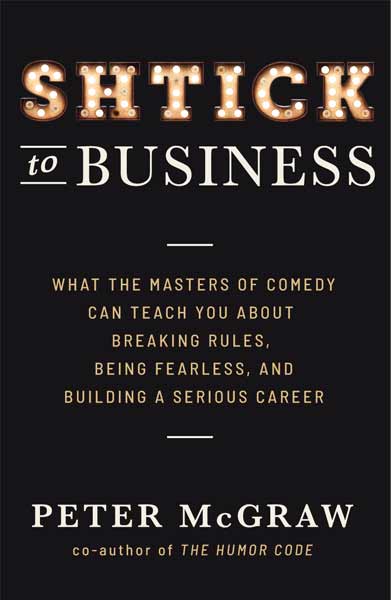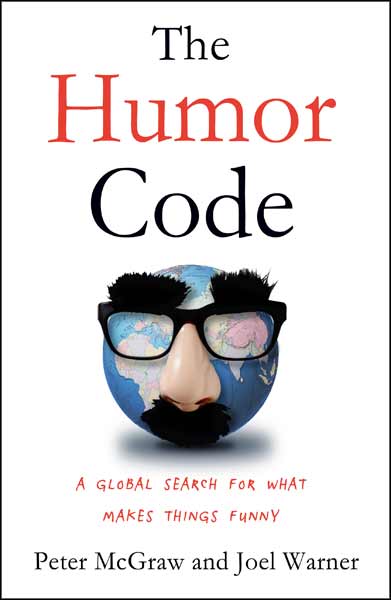The Benign Violation Theory
The Humor Research Lab uses the Benign Violation Theory as its theoretical foundation.
In collaboration with Caleb Warren, McGraw has been developing and testing a general theory of humor called the benign violation theory. The theory builds on work by a linguist, Tom Veatch, and integrates existing humor theories to propose that humor occurs when and only when three conditions are satisfied: (1) a situation is a violation, (2) the situation is benign, and (3) both perceptions occur simultaneously. For example, play fighting and tickling, which produce laughter in humans (and other primates), are benign violations because they are physically threatening but harmless attacks.
A strength of the theory is that it also explains when things are not funny: a situation can fail to be funny because it depicts a violation that does not simultaneously seem benign, or because it depicts a benign situation that has no violation. For example, play fighting and tickling cease to elicit laughter either when the attack stops (strictly benign) or becomes too aggressive (malign violation). Jokes similarly fail to be funny when either they are too tame or too risqué.

According to the theory, a violation refers to anything that threatens one’s beliefs about how the world should be. That is, something seems threatening, unsettling, or wrong. From an evolutionary perspective, humorous violations likely originated as threats to physical well-being (e.g., the attacks that make up tickling, play fighting), but expanded to include threats to psychological well-being (e.g., insults, sarcasm), including behaviors that break social norms (e.g., strange behaviors, flatulence), cultural norms (e.g., unusual accents, most scenes from the movie Borat), linguistic norms (e.g., puns, malapropisms), logic norms (e.g., absurdities, non-sequiturs), and moral norms (e.g., disrespectful behavior, bestiality).
However, most things that are violations do not make people laugh. For a violation to produce humor it also needs to be perceived as benign. That is, it needs to seem okay, safe, or acceptable. Research in HuRL has highlighted three ways that a violation can seem benign: 1) Alternative norms (e.g., one meaning of a phrase in a pun doesn’t make sense, but the other meaning does), 2) commitment to a violated norm (e.g., men find sexist jokes funnier than women do), and 3) psychological distance (e.g., “comedy is tragedy plus time”).
Academic Papers
- McGraw, A.P. & Warren, C. (2010). Benign violations: Making immoral behavior funny. Psychological Science, 21, 1141–1149.
- McGraw, A.P., Warren, C., Williams, L., & Leonard, B., (2012). Too close for comfort, or too far to care? Finding humor in distant tragedies and close mishaps. Psychological Science, 25, 1215 — 1223.
- McGraw, A.P. & Warren, C. (2014). Benign violation theory. Encyclopedia of Humor Studies,75–77.
- McGraw, A.P., Williams, L.T., & Warren, C. (2014). The rise and fall of humor: Psychological distance modulates humorous responses to tragedy. Social Psychology and Personality Science,5, 566–572.
- McGraw, A.P. Williams, L.E., & Warren, C. (2014). Psychological distance. Encyclopedia of Humor Studies, 602–604.
- Warren, C. & McGraw, A.P. (2014). Humor appreciation. Encyclopedia of Humor Studies, 52–55.
- McGraw, A.P., Schiro, J. & Fernbach, P.M. (2015). Not a problem: The downside of humorous appeals. Journal of Marketing Behavior, 1, 187–208.
- McGraw, A.P., Warren, C., and Kan, C. (2015). Humorous complaining. Journal of Consumer Research, 41, 1153–1171.
- Warren, C., & McGraw, A.P. (2015). What makes things humorous. Proceedings of the National Academy of Sciences, 112 (23), 7105–7106.
- Warren, C. & McGraw, A.P., (2016). When does humorous marketing communications hurts brand attitudes? Journal of Marketing Behavior, 2, 39–67.
- Warren, C., & McGraw, A.P. (2016). Differentiating what is humorous from what is not. Journal of Personality and Social Psychology, 10, 407–30.
- Warren, C., Barsky, A. & McGraw, A.P., (2018). Humor, comedy, and consumer behavior. Journal of Consumer Research, 45, 529–552.
- Warren, C., Percival Carter, E., & McGraw, A.P. (2019). Being funny is not enough: The influence of perceived humor and negative emotional reactions on Brand Attitudes. International Journal of Advertising.
- Warren, C.W., Barsky, A. & McGraw, A.P. (Forthcoming). What makes things funny?: An integrative review of the antecedents of laughter and amusement. Personality and Social Psychology Review.
- McGraw, A.P., Carter, E.P., & Harman, J.J., (Working paper). Humor production and perceptions of psychological health.


